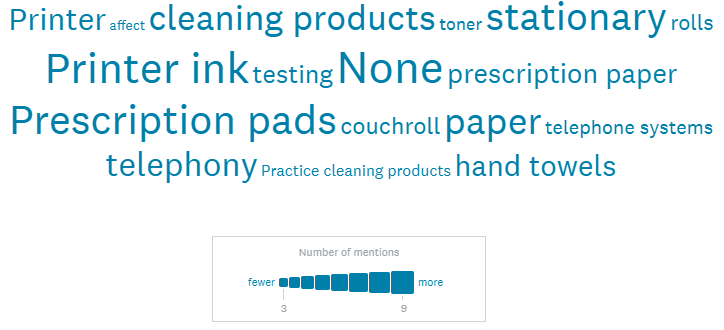EU Exit Planning: Non-Clinical Goods and Services
![]() Thank you for responding to our recent survey on practice needs in the event of a no-deal Brexit. We rely on your input.
Thank you for responding to our recent survey on practice needs in the event of a no-deal Brexit. We rely on your input.
Following a discussion at our Annual General Meeting on Thursday 24 January, we asked you about the impact of a no-deal EU exit on your practice-critical Non-Clinical Goods and Services (NCGS). Medical devices, clinical consumables and medicines are being considered separately.
We asked you to consider:
- The dependency of those goods/ services on that front-line service;
- The criticality of that front-line service and its clinical importance; and
- Outsourced services such as equipment maintenance.
We had a really good response and have been able to advise officials about supply concerns across London in good time. Whilst there were a number of respondents who are unconcerned about the impact of no-deal Brexit, those who do harbour concerns highlighted a number of non clinical products and services which they fear might be affected. These include:
- Stationary;
- Printer ink;
- Prescription pads;
- Couch roll;
- Paper;
- Telephony;
- Cleaning products;
- Prescription paper;
- Printer;
- Hand towels;
- Testing;
- Telephone systems;
- Practice cleaning products; and
- Toner.
We will continue to work with officials to identify and anticipate the impact of Brexit on London general practice, be it no-deal or otherwise. Other possible EU exit risks include:
- Goods or services that have supply chain touch points in the EU;
- Personal data held in EU member countries;
- Supply routes into the UK via Dover/ Calais; and
- Dependencies on EU regulations.
If you have any comments or questions about this work, please contact us.
This word cloud gives some indication of respondents' concerns.

Releasing capacity in general practice: invitation to free roadshow (19 Jan 2016)
London GPs are invited to a free workshop co-hosted by NHS England and the BMA. The event is intended to improve understanding of the evidence about workload, provide insights into...Taking the next steps in encouraging the use of online services for patients (19 Jan 2016)
As the NHS develops its strategy for encouraging patients to make use of online services, the uptake within primary care has been patchy. As part of the process for ensuring...NHS England GP engagement survey (19 Jan 2016)
South East CSU is developing an outline business case for an improved system of urgent and emergency services on behalf of NHS England, and would like GPs to help by answering...Mandatory reporting requirements for GMC and NHSE Performers’ List (19 Jan 2016)
There have been a number of recent cases of GPs not being aware of the extent of the requirements for reporting an untoward occurrence to the GMC and/or NHSE under...It's election year at Londonwide LMCs! (19 Jan 2016)
It’s LMC election time again at Londonwide LMCs! Elections take place every two years on a rolling basis and any GP working in one of the 27 London boroughs we...Parental leave arrangements (19 Jan 2016)
Parental leave arrangements Since 1 April 2015, all practices have been entitled to reimbursement of the cost of GP cover for parental leave – that is maternity/paternity/adoption leave. This is...Speakers’ Corner - NHS England’s (London) Kenny Gibson on why the flu vaccine is important. (19 Jan 2016)
This month Kenny Gibson explains the importance of the flu vaccination programme. Kenny is Head of Public Health Commissioning for...Apprenticeship programme for General Practice in North West London (18 Jan 2016)
Londonwide LMCs and Health Education NWL are working in partnership with training providers to deliver apprenticeships in Business and Administration and Clinical Healthcare. We are currently running a successful pilot...Registration now open - Dr Phil Hammond to chair Londonwide LMCs’ annual conference on 20 April 2016 (14 Jan 2016)
Winter planning resilience guide to help practices (04 Jan 2016)
Our Winter Planning resilience guide will help GPs and their practices create and maintain a business continuity plan. The guide can be downloaded from our...Guidance
We provide expert guidance for practices in our guidance section, as well as an archive of other materials you may find useful.
GP Support
Contact our GP Support team if you need help or advice.
The team provide professional and pastoral support to GPs and practice teams on a broad range of issues.

